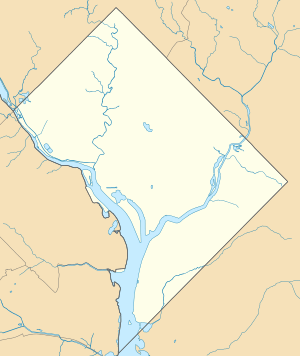U.S. Department of Agriculture Cotton Annex
|
U.S. Department of Agriculture Cotton Annex | |
|
| |
   | |
| Location |
300 12th Street, S.W. Washington, D.C. |
|---|---|
| Coordinates | 38°53′8″N 77°01′40″W / 38.88556°N 77.02778°WCoordinates: 38°53′8″N 77°01′40″W / 38.88556°N 77.02778°W |
| Built | 1937 |
| Architect | Louis A. Simon |
| Architectural style | Modern Movement, Stripped Classicism |
| NRHP Reference # | 15000683 |
| Added to NRHP | October 5, 2015 |
The U.S. Department of Agriculture Cotton Annex is an office building located at 300 12th Street SW in Washington, D.C.[1] The size of the building has been variously given at 89,000 square feet[2] and 118,000 square feet.[3]
History and architecture
The Cotton Annex was built from 1936 and 1937 for the United States Department of Agriculture (USDA).[4] The building was originally for offices and laboratories of the USDA's Bureau of Agricultural Economics (BAE), which was previously housed in headquarters that were being demolished as part of the expansion of the Bureau of Engraving and Printing.[1] The site selected for the Cotton Annex was in accordance with the 1901 McMillan Plan.[1] Funds for the construction were appropriated by Congress in the Public Buildings Act of 1926.[1]
The Cotton Annex was designed by the Supervising Architect of the Treasury, Louis A. Simon.[1] It is a six-story brick building in the Stripped Classical architectural style.[1] The Cotton Annex "has distinctive walls of variegated buff-colored brick laid in an all-stretcher bond, and is covered with a flat roof with limestone coping and a tall parapet roof on the west and north elevations."[1]
The Cotton Annex was the headquarters of the USDA Cotton Division from the building's completion until 1964, when the Cotton Division's Standards section moved to Memphis, Tennessee.[1] Other USDA divisions moved into the empty laboratory space, and other offices of the Cotton Division remained in the Cotton Annex until 1982.[1]
In 1982, the General Services Administration (GSA) acquired ownership of the building.[1] The USDA vacated the building in 2007, giving maintenance and repair responsibilities to the GSA.[4] In October 2007, the GSA and the Federal Protective Service (FPS) entered an agreement for the FPS to use land on the Cotton Annex complex as a screening facility for inspection of trucks making deliveries to the Ronald Reagan Building and International Trade Center.[4] The building itself, however, remains vacant.[1]
In May 2007, the Subcommittee on Economic Development, Public Buildings and Emergency Management of the United States House Committee on Transportation and Infrastructure held a "field hearing" at the Cotton Annex. Chairman John Mica of Florida, a Republican, pressured the GSA to sell the building.[2][4] GSA Public Buildings Service Commissioner Bob Peck testified that although the complex's operation costs are $279,000, the FPS covers those costs as part of the rental agreement for the property.[2]
In April 2014, GSA Administrator Dan Tangherlini proposed making a deal with developers to trade the Cotton Annex and the GSA's own regional headquarters in exchange for work on the GSA's main headquarters and the long-delayed Department of Homeland Security consolidation project, a project to build a new consolidated DHS headquarters at the former St. Elizabeths Hospital site in Southwest DC.[3]
See also
- National Register of Historic Places listings in the District of Columbia
- Southwest Federal Center, Washington, D.C.
- Jamie L. Whitten Building
- United States Department of Agriculture South Building
References
- 1 2 3 4 5 6 7 8 9 10 11 United States Department of Agriculture Cotton Annex, 300 12th Street SW, Square 326, Lot 805, Historic Preservation Review Board (Historic Landmark Case No. 15-16).
- 1 2 3 Daniel J. Sernovitz, GSA not keen on Cotton Annex sale, Washington Business Journal (March 22, 2012).
- 1 2 Jonathan O'Connell, GSA offers Cotton Annex and regional offices to advance construction work at St. Elizabeths, Washington Post (April 7, 2014).
- 1 2 3 4 Sitting on our Assets: The Cotton Annex, Robert A. Peck, Commissioner, Public Buildings Service, U.S. General Services Administration, testimony for the Subcommittee on Economic Development, Public Buildings and Emergency Management of the United States House Committee on Transportation and Infrastructure (March 22, 2012).